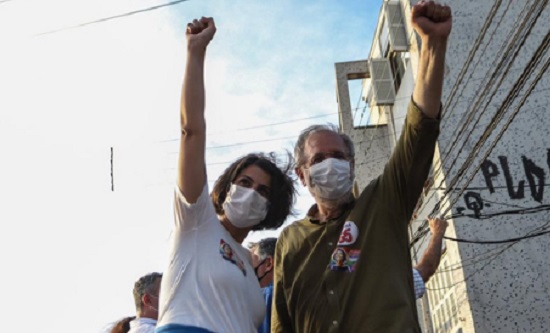
The reactionary Jair Bolsonaro government suffered severe setbacks in municipal elections on 15 November. One hundred and fifty million voters were able to elect mayors, vice mayors and councillors from 5,568 municipalities, while Brazil suffers the third highest number of coronavirus cases and second highest number of fatalities in the world. More than 168,000 Brazilians have died so far because of Covid-19, and the vote expresses condemnation of Bolsonaro’s attack on the health service and his refusal to direct a programme to protect the working class. Alvaro Michaels reports.
Brazil’s healthcare system has been drastically reduced since 2017. This disastrous situation, compounded by events, such as the October decision to prosecute the president’s son, senator Flavio Bolsonaro, with embezzlement, money laundering and criminal association, has hardened the mood against Bolsonaro. This has been encouraged by the landslide victory of the Movement for Socialism in the Bolivian elections, and the defeat of Trump in the US presidential election.
The changing electorate
This was the first election in which non-white registered voters, representing 56% of the population, outnumbered white voters. Black and brown people suffer much higher unemployment rates and poverty and are under-represented. Their candidates’ campaigns are underfunded because while Brazilian political parties receive public funds and free TV and radio airtime to run their campaigns, the leaders of the bigger parties – except the Workers Party (PT) – always distributed money prejudicially. During the last elections, 13% of the candidates were black women but they only received 8% of the funds. Black men received half the amount of the average white male candidates. Now, groups like the Favela Front, born in Rio de Janeiro’s slums, are developing towards becoming political parties, but currently support candidates representing the mostly black population there. More women are entering such groups.
The current social crisis requires that Brazil shares what it has, but those in power have no such intention. Paulo Guedes, economy minister, is determined to privatise state companies and reduce public spending, pointing to Brazil’s rising national debt, which is forecast to reach 95% of GDP by the year end. The economy is expected to contract 4.7% this year, the biggest fall since 1900.
While Bolsonaro’s popularity temporarily rose after March, largely due to emergency Covid-19 aid benefitting half the population, the monthly $120 handout was then reduced by half, and the country’s unemployment rate rose to a record 14%. In May, new measures allowed the reduction of wages and the suspension of employment contracts during the pandemic. A reduction of hours and wages was approved and a temporary suspension of employment contracts and redundancy payments for those in the formal sector. By January 2021, state credit will run out and the government will be unable to continue the spending.
In the election, at least 150 city council candidates in the municipal elections used the Bolsonaro symbol. The outcome in many smaller towns, as well as Manaus, Belo Horizonte, Rio and most significantly Sao Paulo, saw these, and other Bolsonaro allies, trounced and knocked out of the 29 November runoff. A record number of LGBTQ candidates ran for local offices. Monica Benício, the widow of murdered left-wing councillor Marielle Franco, was elected to Rio’s city hall for the Socialism and Liberty Party. In Belo Horizonte, Bolsonaro’s candidate was drubbed by the incumbent mayor Alexandre Kalil (Humanist Party of Solidarity) who won over 63% of the vote. The president’s cousin got a pitiful 4% of the vote in Jaboticabal. The Socialism and Liberty Party (PSOL) – which grew out of the Workers Party in the early 2000s, tripled its city council members in São Paulo and made it to the second-round Mayoral runoff, as did the Communist Party of Brazil candidate Manuela D’Avila in Porto Alegre. According to reports, fake and misleading posts about D’Avila were shared 529,075 times over social media, and a regional court ordered that 91 links to false claims about her be taken down from social media sites just before the elections. The Workers Party weakened by the immense lawfare and press campaign against it for the last five years came in sixth place in Sao Paulo, nevertheless it had the sixth highest number of votes cast nationally.
Since October, Bolsonaro had campaigned for candidates committed to ‘God, Homeland, and Family’ the same slogan as the Brazilian Integralist Action, a movement inspired by Italian fascism. President Bolsonaro no longer belongs to any party following the fractious split in the Social Liberal Party (PSL) which he joined opportunistically for his 2018 presidential campaign. The PSL then leapt to become the second largest in Congress, but disappeared in the current city campaigns. The voters have turned back to the establishment parties like the Democrats and the Brazilian Social Democratic Party.
Constant defamation of the Workers Party (PT)
Prior to the election more attempts were made to discredit the PT by bringing yet further charges against ex-president Lula, accusing him of money laundering. Five of the previous nine charges have been dismissed, so far. The idea is to exhaust and discredit Bolsonaro’s foremost opponent and the PT The current PT president, Gleisi Hoffman, rejects this shameless nonsense. She was elected as the new president of the PT in June 2017 making her the first woman to preside over the party. Charges conjured up against her for embezzlement of $1m – part of the ‘lawfare’ campaign against the PT – were dismissed in 2018. The new success of the Socialists (PSOL) and Communists (PCdoB) in Brazil must build a movement that puts the demands of the poorest and most oppressed at the forefront of its campaign to remove the ruling class in Brazil.




